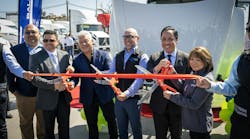Despite being one of America's larger private fleets, it's quite possible you've never heard of AAFES. And that's just fine with them, because their customers certainly know who they are.
The Army and Air Force Exchange Service (AAFES) delivers food, merchandise and whatever else military families and active-duty soldiers need through more than 174 stores and 1,300 fast-food restaurants in over 3,100 facilities worldwide. Founded in 1895, AAFES generates more than $8.5 billion a year in revenue, with over $2.4 billion in the past ten years poured back into military morale, welfare and recreation programs. It has grown into a quiet, yet important member of our military.
The organization is a joint command of the U.S. Army and Air Force and is managed by a board of directors that answers to the secretaries of the Army and Air Force through the Service Chiefs of Staff. But just because AAFES's fleet operations are not your typical carrier does not mean they are not interested in being as green as possible. “It's very important for us to have a good public image,” says Alan French, chief of transportation operations.
The company conducts a number of programs and utilizes a number of technological advances to stay ahead of the green curve, recently making the decision to switch its primary tractor from Freightliner Columbia models to the more fuel-efficient Cascadia with a smaller, but more powerful DD15 engine.
With 428 tractors, 285 based domestically, and 1,707 trailers in the fleet, small changes can make a big difference. And oil savings is another area that AAFES has attacked recently, switching its domestic fleet to the OPS-1 onboard oil refining system developed by Oil Purification Systems (OPS). French says the company learned of the OPS product after discussions with Oregon-based Cascade Sierra Solutions, a nonprofit dedicated to reducing carbon emissions.
“For AAFES, cleaning up the environment begins at home,” says Maj. Gen. Keith Thurgood, Commanding General of AAFES. “For our facilities residing on Army and Air Force installations across the globe, ‘home’ is the military community where our customers live, serve and shop. AAFES is continuously evaluating our operations, looking for new ways to protect our environment and reduce our carbon footprint. The OPS technology fits perfectly with our environmental sustainability goals, while also saving us money and enabling us to provide a better experience for our customers.”
According to OPS, AAFES conducted a test of the system on ten of its trucks. The results showed that oil changes could be significantly decreased, saving an estimated 70 gal. of oil per year, per truck. Once fully implemented, the organization will see a savings of 17,640 gal. of oil and $882,000 over two years.
“As the Dept. of Defense's oldest and largest retailer, AAFES is actively involved in seeking out technologies that will help meet its goals for promoting environmental sustainability, and ultimately, a better experience for its customers,” says Greg Slawson, COO for OPS. “We are pleased to be involved with AAFES, and believe that the OPS technology will play a role in its mission for many years to come.”
One of the goals in AAFES's sustainability initiatives is to reduce fleet dependency on fossil fuels. The company utilizes B20 biodiesel whenever possible and has access to 102 facilities capable of filling tanks with the fuel, according to French. The company cut its fossil fuel dependence by 2% in 2008 vs. 2007.
Other areas of sustainability for AAFES include energy and water consumption reduction efforts, waste reduction efforts, increasing the use of sustainable technology and design in new and existing buildings, and an increase in procurement, marketing and sales of environmentally friendly goods and services.
Thermo King APUs, along with automatic tire inflation devices to maintain proper tire pressures, are used to minimize the fleet's environmental impact. French says the company is also studying wide base tires for their fuel-efficient characteristics, the use of software programs and trailer skirts.


